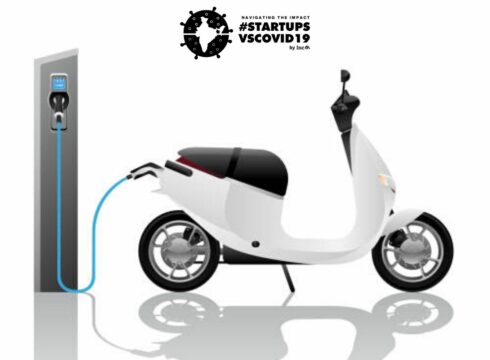SUMMARY
The localisation of supply chain could allow electric vehicle industry to cut reliance on imports
EV battery manufacturing needs a big push along with component manufacturing
EV manufacturers have shut their manufacturing facilities in India for the lockdown
Inc42 Daily Brief
Stay Ahead With Daily News & Analysis on India’s Tech & Startup Economy
Covid19 Tech Impact
Latest updates & innovations, in-depth resources, live webinars and guides to help businesses navigate through the impact of the COVID19 pandemic on India's economy.
As the electric vehicle market in India takes a pause due to the lockdown from the coronavirus pandemic, it’s high time for industry stakeholders to reflect upon their business models and start egging on the government to push for domestic manufacturing.
With electric vehicles, their components and major parts such as batteries being imported from China and other countries, the over-reliance on imports has had a widespread impact on the EV industry in India.
“Since the unfortunate Covid-19 spread has impacted imports, we anticipate that this might push the electric vehicle players to start manufacturing in India,” said Jeetender Sharma, the managing director and founder of Okinawa Scooters.
Sharma added that for Okinawa, over 88% of the supply chain is localised. “It is not really a challenge for us. However, other manufacturers who were earlier importing completely knocked down (CKD) goods from China will face challenges,” he affirmed.
Similarly, Pankaj Tiwari, business development head of EV two-wheeler maker Nexzu Mobility said that the company had previously planned to localise its supply chain, but “coronavirus came into the picture and the whole cycle got disturbed.”
The bitter reality is that the battery cells are not manufactured in India, and most players have no other option but to import from China, Japan, Korea, etc. At the same time, the battery manufacturing market in India is also at a nascent stage.
Many of the battery manufacturers that we spoke to said that they have started working on developing Li-ion battery technologies indigenously for electric vehicles recently, while some said that they make only battery packs, where the battery cells are still being imported from China, Japan and Korea among others.
EV Batteries Take A Hit
Among the players looking to make a mark in battery manufacturing in India are Log 9 Materials, RACEnergy, Cell Propulsion and ION Energy, Amara Raja Batteries along with the government-backed projects runs by ISRO, Bharat Heavy Electricals Limited (BHEL), Naval Science & Technological Laboratory (NSTL) among others.
Due to the lockdown situation across India, several businesses are going through a rough patch. A few experts and analysts that Inc42 spoke to said that the manufacturing operation in China has already resumed. “It is just that the entire country [India] is in lockdown stage due to Covid-19. Once this is over, industry stakeholders will be able to access the situation better,” the electric vehicle analyst added.
Okinawa’s Sharma said it is focusing more on marketing activities to improve brand recall and has put their manufacturing on hold. “It is safe to work remotely on the marketing front and keep the business going. We will be working towards strengthening Above the Line (ATL) activities for the brand until things get better,” he added.
Okinawa had also told Inc42 that it had plans to expand their dealership network pan-India with sales over 75K vehicles by 2021. “One cannot deny that there will be a slowdown — not just in the electric vehicle industry, but across the sectors. Given current circumstances, it will be difficult to anticipate how the market behaves in the coming quarters,” replied Sharma.
Further, Nexzu Mobility’s Tiwari told Inc42 that it has enough resources to manufacture electric vehicles for the next 30-45 days. Similar to Nexzu, other electric vehicle players in India are also going through the same challenges and are trying to democratise the supply chain, which is the need of the hour. On an average, Nexzu Mobility which started its production a year ago, used to produce close to 250 per month.
“It is a challenging situation — we must not panic and have to be prepared for the worst as this is a global crisis. This is not specific to the electric vehicles market per se, but every other sector has been impacted because of this deadly virus” Tiwari said.
What Is The Need Of The Hour For Electric Vehicle Industry?
In a bid to mitigate the business impact, Okinawa said that it will be accelerating marketing activities and also strengthen its dealership network and post-sales services. It also believes that the background work done in this direction will enable them to pick up the market better as things return to normalcy.
Optimistic about the future, Okinawa said that it is well prepared to launch back-to-back products to fulfil consumers’ demand and requirement. It is confident about launching its first electric vehicle motorcycle by the third quarter of the year and start a new facility in Rajasthan. “It will be difficult to give a specific timeline,” Sharma added, accounting for the current situation.
In times of crisis, the electric vehicle players roles and responsibilities need to be focussed towards citizens, where they are practising social distancing, safer ways of operations and promote good hygienic practices among all its employees, clients and consumers. In other words, companies need to put public safety first in the current climate.
“The safety of all our citizens is our topmost priority,” said Amit Gupta, cofounder at Yulu, an electric shared mobility startup. He further said that as much as the company advises people to stay at home, their on-ground staff is tirelessly sanitizing all Yulus and working towards ensuring the safety of people who are still on the go.
“We are ensuring that we are able to run our service with the least disruptions,” concluded Gupta.
Note: We at Inc42 take our ethics very seriously. More information about it can be found here.


